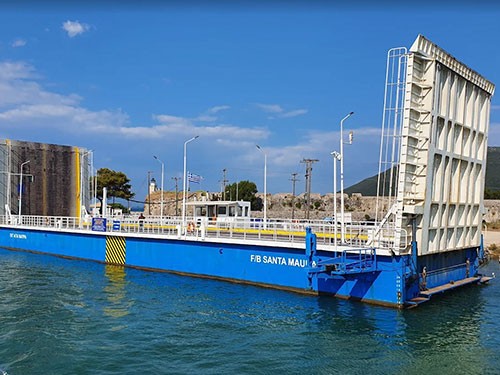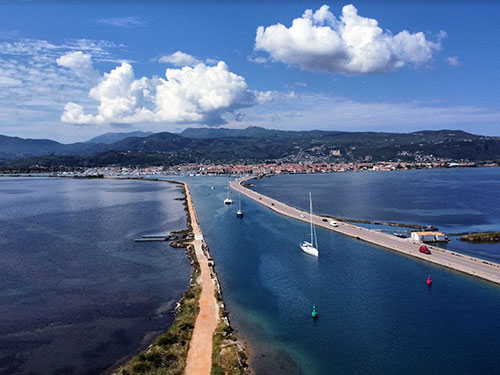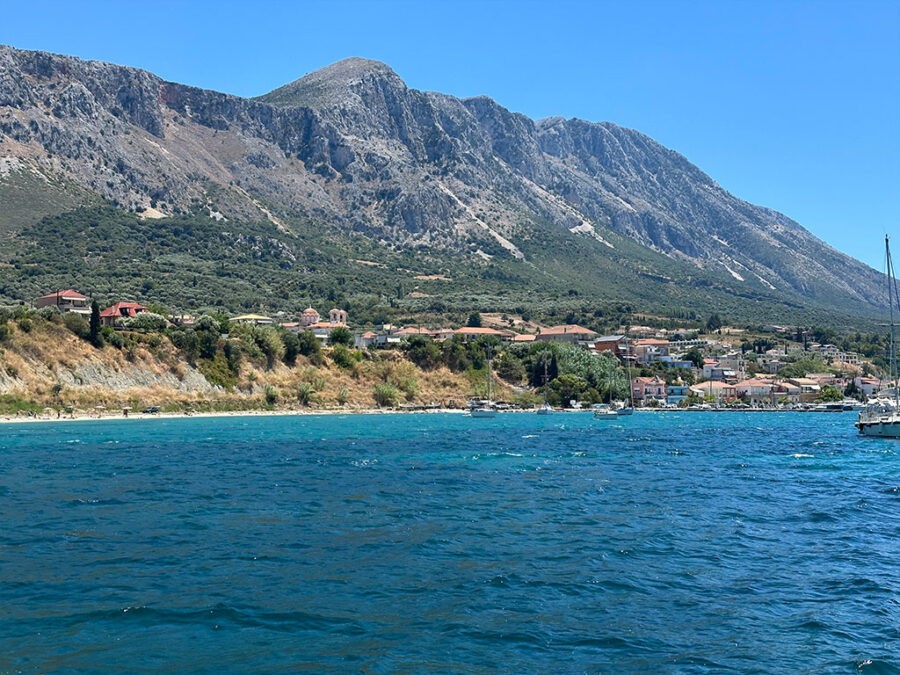The Lefkada Bridges Comedy
Greece is a very beautiful country and the people are generally very friendly. Especially if you speak a few words of Greek.
Some points are confusing and a bit hard to wrap my head around. For example, the Tepai. As a sailor, you have to pay a tax if you want to sail here. For us, that’s €110 per month, which we can pay online. Once you have paid it, there is no receipt, just a note in your online tax account saying ‘paid’ – thankfully also in English, in the Roman alphabet. When we were asked if we had paid the Tepai, a simple ‘nai’ (pronounced ‘ne’) was always enough – because that means “yes” in Greek and sounds like a casual ‘no’. Confusing, but it works. However, this is the exact opposite of everything else that has to do with money transfers in everyday life.
Otherwise, you need receipts or invoices for everything. When you shop or eat in a restaurant, the operators insist that you take the receipt with you. There are no invoices for private individuals anywhere. When I once asked for one, the saleswoman started to hyperventilate and immediately called her tax advisor in a panic. Apparently, it’s all still the aftermath of the troika or the “Schäuble trauma” from 2008.
There are also rules for sailors, which are apparently treated as confidential. For example, anchoring is prohibited within 200 metres of beaches that are in use. Others say 300 metres. 100 or 200 metres for beaches that are not in use. This is not so easy, because with the shifting winds, we can quickly find ourselves 100 metres closer or further away. So, when the wind is blowing offshore, we have to anchor 300 m (or 400 m) away so that we are still far enough away when the wind blows onshore (and it will). No one has been able to explain to me how the distances work with shore lines. Relaxed as the Greeks are, this is only checked if someone complains.
Inhospitable Dessimi
Someone complained about us. After the hunt in Mesolongi (last article), we visited Dessimi Bay on the east side of the island of Lefkada. A beautiful and deep bay. Very lively with taverns and beachgoers, framed by picturesque rocks and caves with clear water. Really beautiful. We approached the beach and dropped anchor at a depth of just under 20 metres. The onshore wind turned us close to the beach, but still at a distance of (very) just under 200 metres. Then a 62-foot charter catamaran with crew arrived and the capable pro skipper actually moored his catamaran very close to the beach to pick up his guests.
Apparently, someone on the beach didn’t like that and called the Coast Guard. By the time they arrived, the large cat had already left. But when you come all this way, you have to take action. And so the Coast Guard chased us and four other boats away that were allegedly too close to the beach. If only there had been an offshore wind, we would have been 100 metres further away from the beach. All the other anchorages were occupied at this time, and further out we would have had to anchor in 30 metres of water. A bit too much for us. So we pulled in the chain and headed 10 nautical miles further to Palairos. This meant no business for the tavernas in Dessimi – but perhaps they were the ones who complained. A pity.
Palairos
On the mainland side lies the large bay of Palairos, one of the largest anchorages anywhere in the Ionian. A village of 2,000 inhabitants on the east side and a bay 1.5 nautical miles wide. No matter how crowded it gets, everyone has plenty of space in clear water. On the east side near the village, the seabed is rocky. In the west, there is plenty of sand but also seagrass. The wind changes direction in the afternoon and picks up considerably – as everywhere else. At this anchorage, we heard the news worthy of a Ministry of Silly Procedures – made in Greece.
The Lefkada Bridges Comedy
The beautiful island of Lefkada is home to 22,000 people and welcomes visitors to its 160 hotels. The sailing industry is an enormously important economic factor. Around 1,000 charter boats await charter guests in Lefkada alone, and the whole island benefits from this.
This charming island is connected to the mainland by a single bridge. The bridge, named Agia Mavra, is a swing bridge. It opens several times a day to allow ships to travel to and from Corfu. An estimated 9,000 vessels pass through the Lefkada bridge each year. That used to be the case when the bridge opened — but it doesn’t anymore. All ships heading north to south or vice versa have to sail west around Lefkada. That’s no big deal, but 50 extra miles (depending on the destination) can ruin some charterers’ plans. It affects us too, because we wanted to take our family across the bridge to Preveza on the other side of the canal.


Floating bridge, Photo: Guillermo R., Lefkada Canal. Photo: Lukas Aron
The mystery remains: why is the only bridge in Lefkada closing at the worst possible time, in the middle of the high season?
It’s the bureaucracy, stupid. The bridge’s safety certificate simply expired after a fixed term of 12 months, suddenly and unexpected. This also meant that its operating licence expired. The Lefkada Port Authority had no choice but to prohibit its operation.
In 12 months, no one in the Ionian Islands administration came up with the fabulous idea of organising a new (indispensable) certificate. So the expiry of the operating licence came as much of a surprise and was as unexpected as the annual Christmas celebrations. The same problem arose last summer. The bridge was closed at short notice then too, but the mainland administration helped out with a special exemption. Not so this summer.
Anyone who thinks that the Ionian Islands administration would have used the last 12 months to solve the problem is completely wrong. Not even maintenance work was initiated. And a movable bridge probably needs more care than a little WD40 and hydraulic grease.
Since a few desk jockeys in the administration can’t be bothered to lift their backsides — probably collecting full pay with zero consequences — the bridge will be out of service for quite a while.
But maybe it’s a devious master plan, e.g. to make Lefkada tourist-free or to drive away the charter bases. Or to fill in the Lefkada Canal and connect it to the mainland. It must be something like that, because no one can be so inefficiently haphazard. Or can they? /Holger Binz


Hallo Ihr Lieben,
bei den traumhaften Griechenland-Kennenlern-Segler-Tagen sind doch so Ereignisse, wie das vom Strand-Weggeschickt-Werden oder die merkwürdig geschlossene Brücke eine schöne Abwechslung.
Alles Liebe
Jürgen
Zur Zeit mit neuer 2. Hüfte in Aachen in Reha